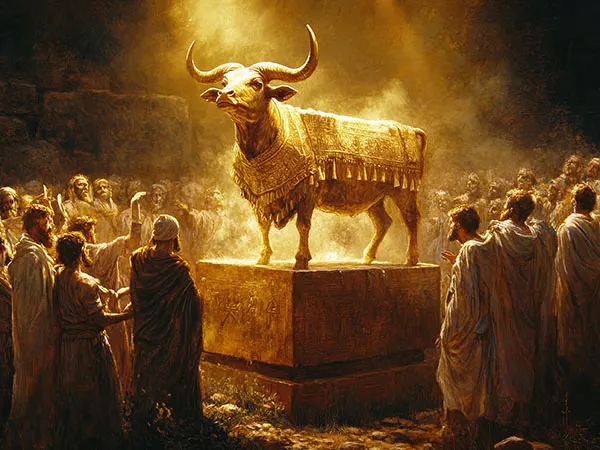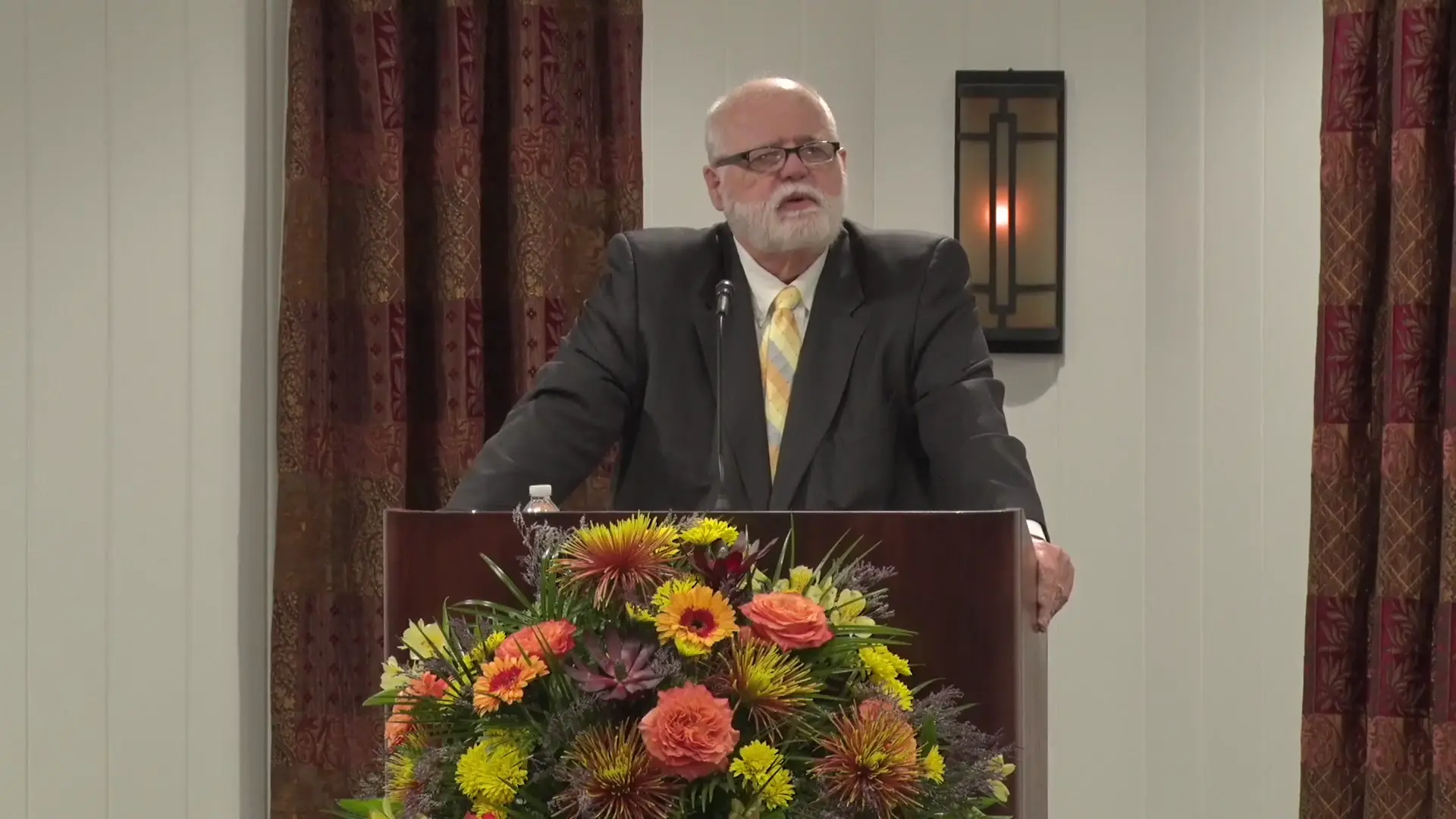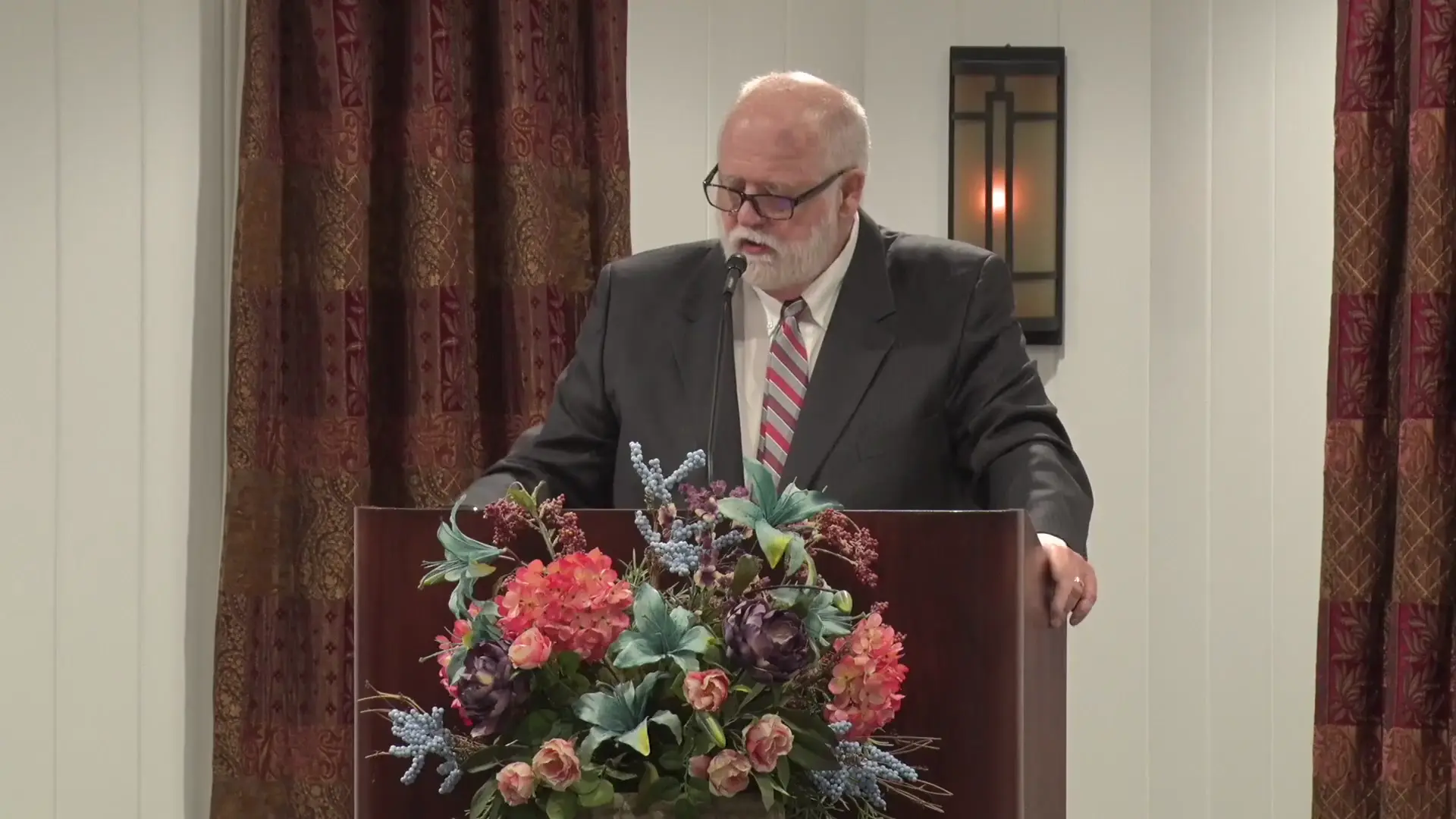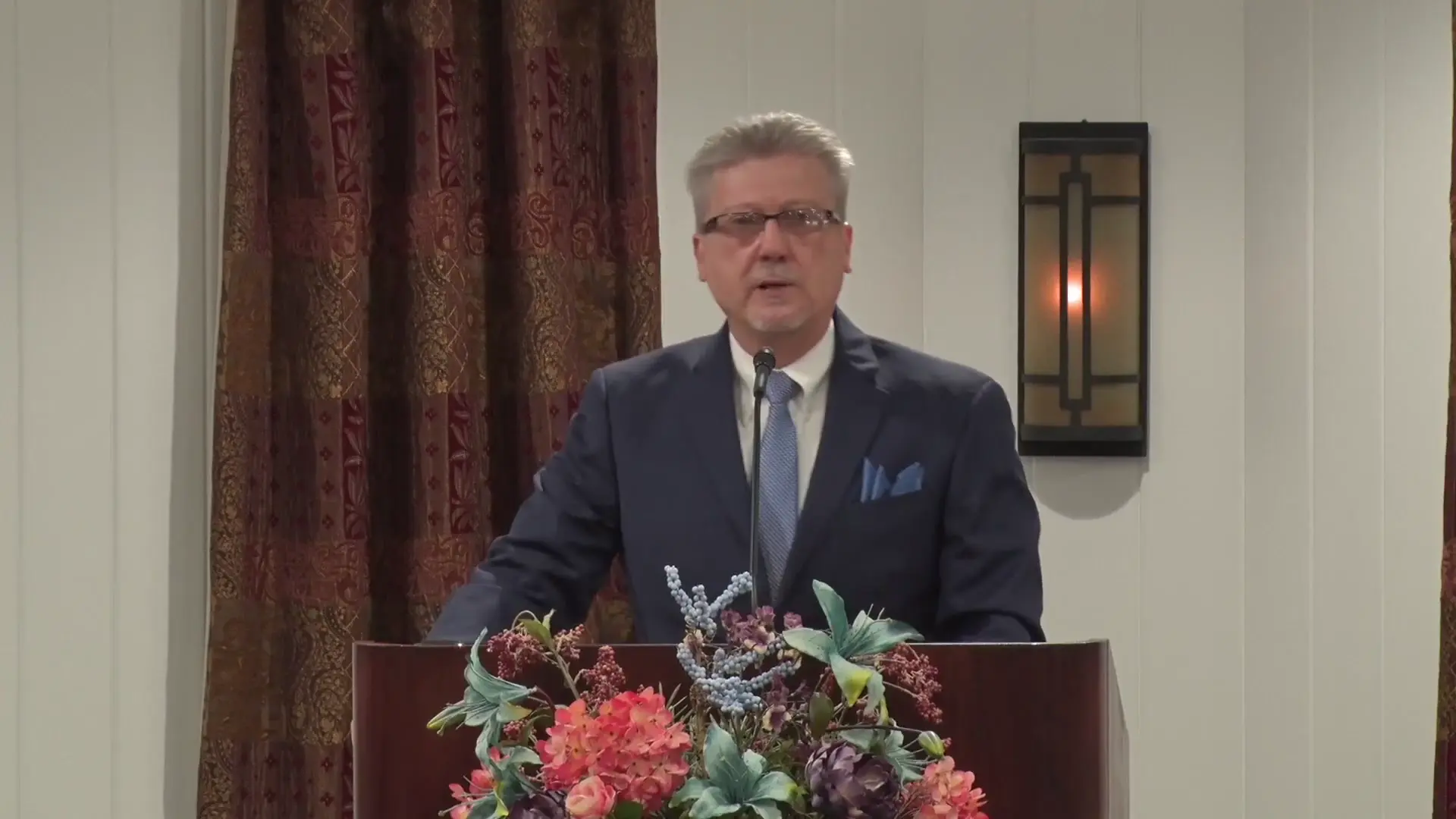Filter by Categories
Entrusted with Godly Holiness
Feast of Tabernacles Sermon by Mark SchindlerGod has entrusted His holiness to those called now into the body of His Son, establishing a relationship with Him that must stand forever. This entrusted holiness is being honed in a major separation from the ways of this dying world, both physically and spiritually. We, as a tiny called-out group from all over the world, bear the privileged responsibility before God to be holy as He is holy, united in love with the Father and the Son through His Spirit. This holiness and love, as Jesus Christ declared, will be a beacon of our unity with Him for the entire world to see. Despite the wrath of a dying world that may come upon us, we must remain faithful in the place He is preparing for us, growing continuously under the guidance of the Holy Spirit in godly holiness entrusted to our care. God has called His elect to truly be holy as He is holy, in unity through His Holy Spirit, requiring everything we have in return for what has been given. He has entrusted us with His holiness from the inside out, and we must vigorously stay the course, diligently learning and living His Word. This is our entrusted position for eternity, demanding fervent effort in every aspect of our lives to grow in truth, love, and grace under His tender care. Judgment has begun with the household of God, and we must be carefully diligent with the holiness already entrusted to us, knowing that He who has begun a good work in us will complete it until the day of Jesus Christ.
Holiness of God (Part 4)
Sermon by John W. RitenbaughGod's holiness is a transcendent purity, indicating His beyondness, His otherness, and His aboveness. He is great beyond our comprehension, surpassing every superlative we can apply to Him. The word "holy" sums up everything we can know and say about God, representing the totality of His excellence. The more we understand about Him, the greater the difference we perceive between Him and us, fostering humility within us. God's power, as seen in the vastness of creation, reflects His holiness. The sun, millions of times larger than the earth, and stars like Sirius and Polaris, demonstrate a majesty that is but a trace of His glory. All the splendor of the universe originates from within our God, showcasing His boundless love, mercy, and creative power. His thoughts are higher than the heavens above the earth, and He remains constant in a changing world, transcendent in reliability and trustworthiness. He assures us, "I will never leave you, nor forsake you," and Jesus Christ declares, "Heaven and earth will pass away, but My words will never pass away," affirming His enduring presence to enforce them. God's steadfast love is as certain as death, yet it overturns death through resurrection and restoration of life. His understanding, goodness, mercy, justice, and kindness are infinite, embodying transcendent purity in every aspect. He calls us to be holy as He is holy, a command that can seem overwhelming due to the vast difference between His sinless nature and our own. Yet, His purpose is not to crush us but to provide an image of what we are to become, transformed into His likeness. God created us in His image, designing us to be like Him spiritually, to embody His goodness, reliability, truthfulness, love, justice, and beauty in a human fashion. Becoming holy is the only way to fulfill the destiny for which He created us; without holiness, no one will see the Lord. Holiness is a fundamental requirement for entering the Kingdom of God, extending beyond righteousness to permeate every aspect of our thinking, speaking, acting, working, loving, and attitudes. The path to holiness is not easy or always clearly marked, yet it must be marked by steady progression in righteousness toward sanctification. God has made a path for each of us that can be attained, ensuring that no trial is beyond our capacity. The key to reflecting His holiness lies in fellowship with Him, established through Jesus Christ. Through this relationship, His holiness is communicated to us, emphasizing the importance of prayer and obedience. God's grace, which began with His call to us, continues to lead us through His Spirit, granting repentance and justification through faith. This grace is essential for sanctification, producing the fruits of the Holy Spirit within us and moving us toward glorification, when we will shine with His radiant beauty. His grace provides whatever is needed, in the right amount, for each person's circumstance, enabling us to carry out our function within the body of Christ. Though the process of growing in holiness requires our effort and will, it is overwhelmingly by His grace that we progress, perfectly balanced by His wisdom to guide us toward becoming holy as He is.
Holiness of God (Part 3)
Sermon by John W. RitenbaughThe holiness of God stands as the central and most profound attribute defining His nature. God is holy, holy, holy, a truth so significant that it is the only characteristic repeated thrice in Scripture, revealing His absolute, unrivaled, and transcendent purity in every aspect of His being and actions. His holiness sets Him apart, marking Him as other, different, and superior, with an infinite distance separating Him from all creation in every quality. This transcendence means that His love, mercy, and justice are all holy, imbued with a purity that exceeds usual limits and shapes every act as Creator and sovereign Ruler. God's holiness is not merely one trait among many; it permeates all His attributes, adding a sacred quality to them. His name is holy because He is holy, and wherever His name is hallowed, there is peace, harmony, unity, prosperity, joy, creativity, and endless life. Yet, this holiness can be confronting, as it exposes human imperfection and shatters self-esteem, leaving one feeling undone and naked before the ultimate standard of cleanliness. The carnal mind is repelled by this holiness, often rejecting or persecuting it because it cannot bear the comparison. Holiness, at its root, means to be cut apart or separated, carrying implications of purity in character and morality, indicating freedom from every stain and separation from anything sinful, evil, or imperfect. When applied to God, it signifies a cut above, a superiority that defines His otherness. He is not like anything or anyone, and to think otherwise is the basis of idolatry, for imagining God to be like us distorts His true nature. God's holiness also governs His judgments, which are always executed with holy love, holy mercy, and holy justice, free from prejudice or whim. His actions, even when they involve severe judgment or death, are consistent with His holy nature, reflecting a balance of love and justice that may be difficult for human minds to reconcile. Yet, His forbearance with humanity, despite our sinfulness, demonstrates a holy patience beyond comprehension, as He seeks to transform us into something holy like Himself. Only God can sanctify and make something holy, lifting it from the commonplace to the special by His presence or declaration. When He separates individuals for His use, they are considered holy, not necessarily because of their character, but due to their position in relation to Him. This sanctification demands that holy things and people be treated with purity and deference, reflecting their connection to God. However, true holiness in us must be perfected through choices, attitudes, and right conduct, moving beyond initial separation to a life that mirrors God's purity. The process of perfecting holiness involves a confrontation with truth, as God reveals Himself through His Word, cleansing minds of deception and lies. This sanctification unto holiness begins with exposure to God's character and nature, the ultimate standard we aim to emulate. Through the power of His Spirit, which draws us toward His holiness, and through obedience born of faith and humility, we are transformed. Holiness is the beauty of God's nature, the excellency that rules all His actions, and the quality we are called to embody in all manner of conduct, striving to remove sin and reflect His divine likeness.

Prepare to Meet Your God (Part Five): Religion and Holiness
Article by John W. Ritenbaugh and Richard T. RitenbaughThe Lord GOD has sworn by His holiness, emphasizing the gravity of His pronouncement against Israel. He, being the only true God, is holy, transcendentally different, superior, and separate from all others. From His holiness flows His love, an outgoing concern for others, which stands as His outstanding attribute. He has called His people to be holy, to reflect His distinct nature in their lives. Yet, when He looked upon Israel, He saw a nation organized around human self-concern, showing no evidence of godly living. Their culture, government, and religion were opposed to Him in every area, revealing a stark contrast to His holiness. Israel failed to see His holiness and compare themselves to it, thus remaining unaware of their need for repentance. Their lack of relationship with Him meant they could not understand His purpose or recognize their shortcomings. True religion, which should mirror His holiness, involves a relationship with Him, submission, obedience, genuine love for His truth, moral integrity, and social responsibility within the community of believers.
As He Is Holy (Part Two)
CGG Weekly by Ronny H. GrahamDo we truly believe that what God has made holy is sacred to Him? When we ignore or trample on His holy things, how close are we to Nadab or Ananias?

Be Holy, as I am Holy
Sermon by Ted E. BowlingHoliness consists of not merely moral behavior, but a complete spiritual transformation, as exemplified by keeping His seventh day Sabbath.
The Priesthood of God (Part Three)
Sermon by John W. Ritenbaugh (1932-2023)Because God is holy, His people must also be holy, displaying the character of God. Holiness designates God-like qualities found in those sanctified by God.
Holiness (Part 2)
Sermon by John W. RitenbaughHoly things are set apart from the rest, consecrated, sanctified, and transcendentally separate. God wants to transform us into that very image.
A God of Many Dimensions
CGG Weekly by Richard T. RitenbaughGod has 'soft' virtues, which most churches proclaim loudly and often, and 'hard' ones, which get little attention. God has having a range of character traits.
The Holiness Code
Sermon by Richard T. RitenbaughA portion of Leviticus, dubbed 'the holiness code,' describes how God lives. In the Sermon on the Mount, Jesus expanded the application of the holiness code.

Holy Ground
Sermon by Ted E. BowlingThe principle of sanctification applies to time as well as place, as God sanctified the seventh day Sabbath as a covenant sign between Him and His people.
The Priesthood of God (Part Four)
Sermon by John W. Ritenbaugh (1932-2023)Our responsibility as a royal priesthood and a kingdom of priests is to become holy as God is holy, exceeding the holiness of the Levitical priesthood.
God's Sea of Glass (Part 1)
Sermon by Martin G. CollinsUnlike tumultuous waves, the sea of glass before God's throne is tranquil and serene. Before we can stand on this sea of glass, we must be set apart and cleansed.
The Fear of God
Sermon by John W. RitenbaughMany have inadvertently adopted a soft concept of God, disrespecting and showing contempt for God's authority and power. Godly fear is a gift of wisdom.
Where God Places His Name (Part Two)
Feast of Tabernacles Sermon by Richard T. RitenbaughBecause we would die from exposure to God's glory, the name of God, reflecting His characteristics, is the only way we can approach God.
How Will We See God?
Sermonette by Bill OnisickRevelation 1:6-9 assures us that every eye will see Jesus Christ when He returns, but in what light will we see Him—in earnest joy or abject fear?
Living By Faith: God's Justice
Sermon by John W. RitenbaughIn order to live by faith, we must understand God's sovereignty, God's character, and God's justice, realizing that we do not see the entire picture.
God Hates?
Sermonette by Ronny H. GrahamGod hates hypocritical religious convocations when people pay lip service but no heart service to Him. Mankind does not know how to stop hate, but God will.
The Fear of God (Part One)
Feast of Tabernacles Sermon by John W. RitenbaughWe must have established some relationship with God before we can rightly fear Him. A holy fear is the key to unlocking the treasuries of salvation and wisdom.
The Priesthood of God (Part Seven)
Sermon by John W. Ritenbaugh (1932-2023)A priest, having cognizance of his own weaknesses, has an obligation to empathize with other peoples' weaknesses and bear one another's burdens.

Living By Faith and God's Sovereignty
'Personal' from John W. RitenbaughSome may doubt that God is in control, but God's sovereignty over His creation is complete. The course of world events are moving according to His will.

Why Worship God?
'Personal' from John W. RitenbaughMany believe without really understanding why we must worship God. He demands it, is worthy of it, and without it, we will not grow into His image.
Holiness (Part 1)
Sermon by John W. RitenbaughTo appropriate the name of God means to represent His attributes, character and nature. Our behavior must imitate Christ just as Christ revealed God the Father.

Did God the Father Forsake Jesus Christ?
Sermon by David C. GrabbeJesus suffered the worst of effects including the temporary separation from His Father because of the Father's love for us, enduring what we should have received.
The Priesthood of God (Part Ten) Conclusion
Sermon by John W. Ritenbaugh (1932-2023)As future priests, we are going to be given rigorous, hands-on jobs to teach people righteousness and holiness, distinguishing between the sacred and profane.
Sanctification and Holiness (Part 4)
Sermon by John W. RitenbaughThe bronze altar, made with the censers from the rebels, was a reminder of the folly of rebelling against holy things, replacing God's standards with human ones.
What Is the Holy Spirit?
'Ready Answer' by David C. GrabbeEven theologians admit that the Holy Spirit is a mystery to them. Yet the confusion comes from pagan thought patterns that have affected how Scripture is read.
Knowing God: Formality and Customs (Part Two)
Sermon by John W. RitenbaughWe must continually upgrade our decorum and formality in our approach to God. What is practiced on the outside reinforces what is on the inside.
Knowing God: Formality and Customs (Part One)
Sermon by John W. RitenbaughFormality and decorum (in terms of dress and behavior) are part of godly standards and sanctity. We must always look for the spirit and intent of what God commands.
How Big Is God?
Sermon by Richard T. RitenbaughWe must not have a one-dimensional perspective of God. Our puny minds can only grasp a tiny sliver of what God really is.
Prepare to Meet Your God! (The Book of Amos) (Part Two)
Booklet by John W. RitenbaughIsrael had every opportunity that the Gentiles did not have. God gave the Israelites gifts to live a better way, but they completely failed to reflect Him.

God's Throne
Sermon by Richard T. RitenbaughSolomon's opulent throne pales miserably in comparison to God's heavenly throne, surrounded by angelic beings, demonstrating the perfection of His government.
To the Glory of God
Sermon by Martin G. CollinsAs we reflect God in our behavior through imitating Jesus Christ, occasionally accepting His suffering when called upon, we reciprocally glorify the Father.
To Do Your Will, O God!
Sermon by Martin G. CollinsThe necessity for Christ's death stems from God's holiness and absolute intolerance of sin and His obligation to judge righteously.
The Sovereignty of God: Introduction
'Personal' from John W. RitenbaughGod's sovereignty is one of the most important issues a Christian must consider. Have we acknowledged that He has total authority over us in particular?
The Great White Throne
Feast of Tabernacles Sermon by Richard T. RitenbaughBoth the time element and the significance of the Great White Throne has been lost on most of 'Christianity' because it refuses to keep God's Holy Days.
Living Up to Our Responsibilities
Sermonette by Mark SchindlerMuch of the pain and anguish of a trial to the Body of Christ may well be caused by someone letting down in his or her responsibility within the Body.
His Eye Is on the Sparrow (Part Four)
Sermon by John W. Ritenbaugh (1932-2023)From the beginning, God has set apart certain individuals, putting them through a sanctifying process, perfecting their character until they reflect His image.

Presumption and Divine Justice (Part Two)
'Personal' from John W. RitenbaughThe Bible reveals a pattern of God's displeasure with presumption. God's justice always aligns with His righteousness, but He often acts in mercy.
The Gift of Eternal Life
Feast of Tabernacles Sermon by Martin G. CollinsThe difference between living forever and eternal life is that longevity does not equate to quality of life. Living forever while enduring pain lacks appeal.
Examples of Divine Justice
Sermon by John W. RitenbaughNadab and Abihu, Ananias and Sapphira, and Uzzah, all aware of the penalties for their actions, rebelled against God's clear and unambiguous instructions.
Amos (Part Six)
Sermon/Bible Study by John W. RitenbaughThe favorite-son status of Israel was conditioned on accepting the terms of the covenant with God. Israel, then and now, has placed her trust in material things.
Do You Really Want Just Any Eternal Life?
Sermon by Martin G. CollinsWe have a natural desire for eternal life, but living endlessly would not be a blessing if our circumstances were miserable. Eternal life means quality of life.
What Is Prayer?
Sermon by John W. RitenbaughPrayer to a tool we must learn to use. Because we take on the characteristics of those we are around, we should keep company with God continually though prayer.
The Handwriting Is on the Wall (2021)
Feast of Tabernacles Sermon by Mark SchindlerWhen comparing the Jewish Disneyland Succoth Extravaganza with the Holy Days kept by Israel, it is obvious that the veil still bars their understanding.
Maintaining Good Health (Part 2)
Sermon by John W. RitenbaughThe cleanliness laws in Leviticus, prescribing cleansing and quarantine, apply to the spiritual dimension as well. God will not tolerate uncleanness.
Deuteronomy (Part 3) (1994)
Feast of Tabernacles Sermon by John W. RitenbaughWe will not be prepared to rule in the Millennium unless we are experientially persuaded of God's faithfulness to His Covenant and His intolerance of evil.